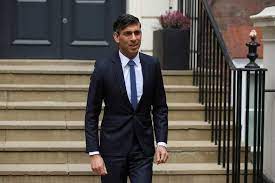
LONDON, May 5 (NNN-AGENCIES) — Britain’s ruling Conservatives suffered high-profile losses as results poured in Friday from Prime Minister Rishi Sunak’s first major electoral test since he took office last year.
In the depths of the worst cost-of-living crisis in decades, the local council elections held Thursday across swathes of England illuminated the main parties’ standing ahead of a UK-wide general election expected next year.
Sunak admitted it was not looking good for his Tories.
“It’s always disappointing to lose hard-working Conservative councillors,” the prime minister told Sky News.
But he vowed to press ahead with the “people’s priorities” — including halving double-digit inflation, restoring economic growth, and stopping boatloads of migrants crossing the Channel.
The vote counting will only be complete later Friday, just as Britain gears up for Saturday’s coronation of King Charles III.
But the main opposition Labour party crowed that the trend was already clear from the 230 English districts electing more than 8,000 council seats.
“These results have been a disaster for Rishi Sunak as voters punish him for the Tories’ failure,” said Shabana Mahmood, Labour’s national campaign co-ordinator.
“These results show that we are on course for a majority Labour government,” she added.
By 9:20 am, 62 councils had declared their results. Sunak’s Conservatives had lost 228 seats — one-third of the total they were defending so far.
That trend would put the centre-right party on course for its worst defeat in local elections since the mid-1990s, before Labour took power nationally in a landslide under Tony Blair.
Transport minister Huw Merriman indicated that his party was paying the price for the chaotic few weeks last year when it ditched Boris Johnson and then Liz Truss as leader in quick succession.
Local constituents have been “talking about older news about former prime ministers — but saying your current leader seems to have what it takes”, he said, insisting that Sunak was on the right track.
Labour was up 119 seats, and took control of prized targets in Plymouth in southwest England, Medway in the southeast and Stoke-on-Trent in the Midlands — where in 2016, 70 percent of voters backed Brexit.
Extrapolating to a national result in the next general election, Mahmood said Labour’s vote share lead over the Tories stood at more than eight percent — enough, she said, for leader Keir Starmer to become prime minister.
Labour is particularly targeting its former strongholds in northern England, the so-called “red wall”, which Johnson turned Tory in the 2019 general election on a vow to “get Brexit done”.
The smaller Liberal Democrat party was up 61 seats, and was making inroads in wealthy Conservative districts on the edge of London that are represented nationally by members of Sunak’s cabinet — the “blue wall”.
The centrist opposition party took control of the council in Windsor and Maidenhead, west of London, an area represented in Westminster by former prime minister Theresa May.
“We are exceeding all expectations,” Liberal Democrat leader Ed Davey said.
“We have delivered a hammer blow to the Conservative party in the blue wall ahead of next year’s general election.”
Jonathan Carr-West, chief executive of the Local Government Information Unit, noted that the Conservatives were already defending a dismal showing the last time the same council districts voted in 2019.
“Voters may well return to the Conservative fold” at the next general election, he said.
“But yes, it’s looking pretty bad for them so far. To do badly from a very bad baseline in 2019 is very, very bad indeed.”
Sunak meanwhile defended a law change requiring voters Thursday to show photo identification for the first time, a move denounced by Labour and others as an attempt to suppress the vote.
The Electoral Reform Society, one of the critics, said Thursday it had seen “countless examples of people being denied their right to vote due to these new laws”. — NNN-AGENCIES





